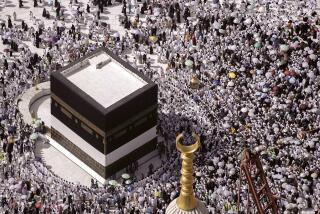Reciters of Koran Evoke Tears, Ecstasy
- Share via
CAIRO — So strong is the emotion whipped up by a good Koran-reciter that Muslims may weep or faint on hearing him intone verses of their holy book.
Some reciters win a following like that of pop or movie stars. Their tapes, which sell by the thousands in Muslim countries, have played a part in the spread of Islam.
Reciters, who memorize the Koran in their youth, deliver verses before Friday prayers in mosques and on radio and television. The best inspire ecstasy in listeners who are moved by both the words and the music of their performance.
“To Muslims, these verses are the holy words of God. They mysteriously feel his presence in every single letter,” said Abdullah Schleifer, an American Muslim.
Egyptians dominate the art, and the death last month of Abdel-Basset Abdel-Sammad deprived Muslims around the world of one of its most popular modern exponents.
Nicknamed “Sheik Brando” because he rose to stardom at the same time as film actor Marlon Brando, Abdel-Sammad was the only foreigner allowed by Saudi Arabia to recite the Koran at the holy shrines of Mecca and Medina.
The appeal of Koranic recitation in Arabic, in which the Prophet Mohammed handed down the holy book more than 14 centuries ago, transcends borders because Muslims who don’t read the language can study it transliterated.
They must recite Koranic verses in Arabic while performing prayers five times a day.
“This is one of the miracles of the Koran, that even if you don’t speak Arabic you feel great consolation in hearing the verses,” Schleifer, who teaches journalism at the American University in Cairo, said.
Koranic recitation has helped spread Islam, according to Ahmed Shaaban, a teacher at one of 15 recitation schools set up by the 1,000-year-old Al Azhar University in Cairo, the world’s oldest center of Islamic studies.
In the early days of Islam, preachers traveled from country to country by camel to teach the religion. Now things are easier--they record their verses on tape.
Shaaban said the Prophet encouraged gifted exponents like Abdullah ibn Massoud and Obai ibn Kaab in his native Arabia to recite the Koran. He told followers, “Take the Koran from Ibn Massoud or Ibn Kaab.”
The art was passed from generation to generation by other reciters in Iraq and Syria until Egypt became the center of recitation more than 800 years ago, Shaaban said.
Egyptians were the first to teach the art in institutes, he said. Today, students from China, Pakistan, Malaysia and African countries are enrolled at the Al Azhar schools.
Abdel-Sammad was one of a long line of revered Egyptian reciters.
A chief reciter in Kuwait, Ahmed Taraboulsi, says nobody can match Egyptian reciters.
“Egypt is the cradle of Koranic recitation. We have all learned it at the hands of the Egyptians who play an important role in teaching Islam and the Koran,” Taraboulsi said.
Since early this century, the government has sent about 300 reciters to America, Europe, Asia and Africa as well as the Arab world every year during the fasting month of Ramadan.
Ahmed Neayna, who combines recitation with working as a pediatrician, is one of today’s rising stars.
With a hand cupped over his ear, he recites Koranic verses before functions attended by President Hosni Mubarak.
Neayna says recitations he has given in London and Munich converted several Britons and West Germans to Islam. He recalls with awe the response of a big audience in New Delhi last year.
“I will never forget the tears of the Indians, and their thunderous rejoicing, uttering the word ‘Allah’ during my recitation,” he said. “It’s a feeling I have never experienced before.”
Neayna said he started reciting in childhood but took it up professionally after the late President Anwar Sadat heard him in 1978 during an official ceremony.
He intends to keep both his professions.
“Koran heals the soul, and as a doctor I help heal the body,” he said.
More to Read
Sign up for Essential California
The most important California stories and recommendations in your inbox every morning.
You may occasionally receive promotional content from the Los Angeles Times.









